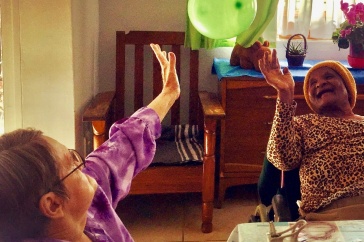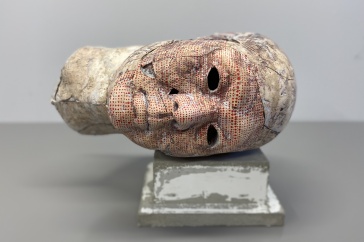
DURHAM, N.H. – A group of University of New Hampshire graduate students in justice studies recently partnered with the N.H. Attorney General’s Office on a jury polling project that aims to better understand the factors that influence not guilty verdicts in adult sexual assault cases.
The students conducted the project for the New Hampshire Sexual Assault Resource Teams (SART) office, which is part of the New Hampshire Attorney General’s Office of Victim/Witness Assistance. The goal of N.H. SART is to enhance and increase the successful investigation and prosecution of adult sexual assault cases, with an emphasis on case review.
The project was part of the course Applied Research Methods taught by Victoria Banyard, professor of psychology. Over the years, Banyard’s graduate students have conducted several similar projects with community partners who work with victims of sexual assault.
“Practitioners such as justice system, prevention and intervention professionals working on community issues like interpersonal violence desire to use best practices. They are under increasing pressure to evaluate the effectiveness of what they do. Professionals are interested in using research to inform their work. Yet, community agencies are often given few resources for collecting, analyzing or conducting assessments,” Banyard said.
“Our class has been a model for many years of how university-community partnerships can help practitioners use and generate the information they need to move their work forward. It's an example of how an academic class that is teaching students new research methods can also be in the service of community engagement,” she said.
For this project, the students spoke with representatives from New Hampshire’s 10 county attorney offices to understand if and when they polled juries after a court case concludes, and, in the case of juries polled in adult sexual assault cases, why the offices poll and what trends they have uncovered, particularly in not guilty cases.
The students recently presented their findings to New Hampshire Attorney General Joseph Foster, representatives of the state’s county attorney offices, victim/witness advocates, mental health workers, and law enforcement.
“Overall, our project demonstrated that jury polling for adult sexual assault cases is used infrequently by county attorneys' offices. However, when it is done, we have seen evidence of lots of rape myth acceptance and victim blaming attitudes for jurors who sit on these cases. Resources and being understaffed are the two main barriers why counties do not jury poll for adult sexual assault cases or do not find polling useful,” said Saige Jutras, 22, of Salem.
The students found that only half of New Hampshire’s county attorney offices poll juries in adult sexual assault cases, and usually only when there is a not guilty finding. Three county attorney offices do not poll juries at all, and two exclude sexual assault cases from jury polling. Those that do not poll juries at all cited lack of resources and understaffing as the reasons why.
For the counties that poll their juries, the students found jury polling is valuable to prosecutors and those involved in adult sexual assault cases as it helps them better understand why the jury found the accused not guilty, helps them decide whether to retry the case, helps to better prepare for future cases, and aids in learning more about juror attitudes in adult sexual assault cases. Jury polling also helps victim witness advocates better prepare and support victims.
Regarding juror attitudes in adult sexual assault cases, the students found:
- Jurors endorse many rape myths and victim blaming attitudes, such as that a rape victim is to blame for her assault depending on what she was wearing, whether she was drinking, and whether she delayed in reporting the sexual assault.
- Jurors hold misconceptions about what rape is and when it can occur. For example, most victims are sexually assaulted by someone they know, not a stranger.
- Jurors often negatively judge the victim and her witnesses based on whether they receive public assistance, are too emotional or not emotional enough, or are unemployed.
- Jurors favor a clear, chronological presentation of the case, value expert testimony, and appreciate visual representations of what occurred.
“The students did a great job, and I think this is going to help continue the conversation about how to better deal with these kinds of cases,” said Kathy Kimball, New Hampshire’s SART coordinator and former state trooper, who worked closely with the UNH students on the project. “They were able to pinpoint very specific areas that I want our state SARTs to incorporate in their work. It was very helpful to have these students collaborating with professionals in the field dealing with these very real challenges,” Kimball said.
Jutras, who will graduate in September with a master’s in justice studies, said the project allowed her to uncover and utilize her personal strengths in contributing to a collaborative effort.
“These kinds of projects are important for UNH students to conduct because they allow students, particularly graduate students, to become engaged and involved in significant societal issues such as sexual assault. Many community partners do not have expendable resources to be conducing these kinds of projects. Therefore, by having graduate students conduct them for them, we are able to aid in uncovering important information that may not be otherwise possible,” she said.
The University of New Hampshire, founded in 1866, is a world-class public research university with the feel of a New England liberal arts college. A land, sea, and space-grant university, UNH is the state's flagship public institution, enrolling 12,300 undergraduate and 2,200 graduate students.
Photo: Pictured from left to right are: Kathy Kimball, New Hampshire’s SART coordinator; Victoria Banyard, associate professor of psychology; and graduate students Nellika Stirling, Jack Paone, Lisa Lamir, Megan Trow, and Saige Jutras.




















































